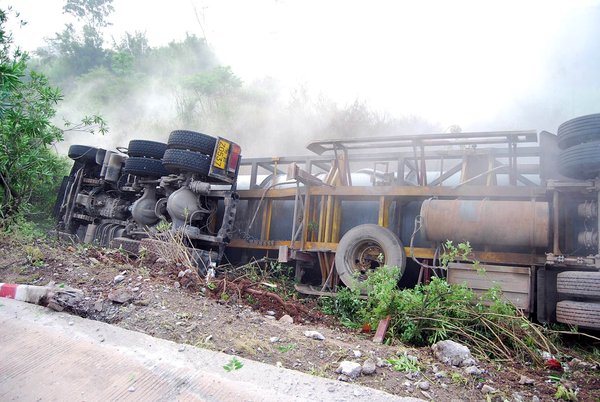Heavier penalties will remind firms to meet eco-standards
 |
|
A tank vehicle loading 26 tons of hydrochloric acid rolled over in Nanxiong city in South China's Guangdong province on April 15, 2012. [Photo/CFP] |
Dystar Group, a German company purchased by the domestic company Longshen in 2010, was recently found responsible for discharging 698 tons of waste acid into a canal without proper treatment by Yangzhou Intermediate People's Court. China Youth Daily comments:
According to reports, the court found the average concentration of the waste acid discharged by DyStar was 59 percent, hundreds of times higher than the legal standard. The waste acid has already caused serious pollution and several neighboring tap water plants have had to suspend production.
The company did not start its illegal deeds until a Chinese management took charge. When the chief manager was a German, the company always neutralized its waste acid then sent it to sewage plants for further processing. It was the new Chinese managers who decided to lower the costs and hand over the waste to an unqualified company which then reassigned the project to a third party, leading to the eventual illicit discharge of the waste acid directly into the canal. It seems many of our compatriots have not formed the habit of strictly following legal standards yet.
Reports show that the German manager spent about 3,000 yuan ($433) to process each ton of waste acid. Under the direction of the Chinese chief manager, DyStar disposed at least 2,698 tons of waste acid at the cost of 580 yuan a ton, saving 6.5 million yuan or so.
The damage done by its illegal deeds are beyond measurement, but the punishments for crimes related to environmental pollution are rather light in this country. The court only fined DyStar 20 million yuan, which is hardly enough to prevent it from committing similar misdeeds again, and certainly far from enough to mend the environmental damage it has already done.
The news reports did not mention whether the court found any individual, such as the chief manager, guilty. But it mentioned that he commanded his subordinate staff to cover up any evidence of the discharging of the waste and destroying the evidence in a bid to escape punishment.

























